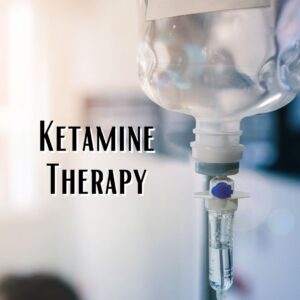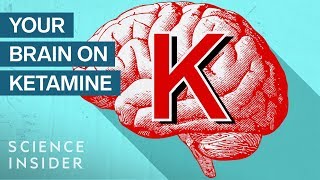Ketamine Therapy
Ketamine has long been used in medicine as an anesthetic. It is also commonly used in veterinary medicine and has had some popularity as a recreational drug due to its relaxing sedative properties. More recently, the mental health community has discovered that ketamine can also benefit patients with treatment-resistant depression. While ketamine therapy shows promise, there are still some unanswered questions about the long-term effects of ketamine therapy, and it has not yet been approved by the FDA as a treatment for depression.
Treating Depression With Ketamine
Does Ketamine Damage Your Brain?
Treatment Resistant Depression Therapy in Milwaukee
IV Ketamine Treatment Near Milwaukee
What is Ketamine?
Ketamine is referred to as a “dissociative anesthetic” due to the detachment patients feel, both from pain and their environment and can be used for a variety of medical purposes. It has the ability to induce a state of relief from pain, sedation, immobility, and even amnesia in patients while under the influence of ketamine.
Ketamine is defined by the Drug Enforcement Agency as “a dissociative anesthetic that has some hallucinogenic effects. It distorts perceptions of sight and sound and makes the user feel disconnected and not in control. It is an injectable, short-acting anesthetic for use in humans and animals.”
How Does Ketamine Work? The History and Science Behind Ketamine
Ketamine was first synthesized in the 1960s as an anesthetic, a sedative. It was useful in the rescue mission. Then in the 1980s, it became a popular club drug. It had nicknames like Special K and Cat Valium. Now, a form of ketamine, esketamine was approved by the FDA for antidepressant augmentation. Esketamine is a prescription nasal spray medication designed for treatment-resistant depression, available in very special circumstances. So how does a drug that is so multipurpose actually work? Ketamine is what scientists call a dirty drug. It doesn’t just target one system in the brain, but dozens. It has a weak effect on opiate receptors and one study actually showed that when patients took naltrexone (which blocks opioid receptors), they did not experience the anti-depressive effects of ketamine. These same receptors are targeted also by drugs like heroin and cocaine. Most importantly, ketamine affects the glutamate system. Glutamate is used in the brain for neurons to communicate. At high doses, ketamine seems to block glutamate, making it an effective anesthetic. But at low doses, glutamate production is enhanced. This can have a variety of effects, some individuals hallucinate or feel they are losing touch with reality. It may also help build new connections or synapses between neurons. Now, when people are under stress for a long time or depressed for a long time, they can start to lose those connections between neurons. When ketamine is administered, some of those effects seem to start to reverse. It is believed that ketamine may help regenerate neuronal connections.
 Ketamine For Treating Depression
Ketamine For Treating Depression
One of the appeals of ketamine is the rapid onset of action and unique mechanism of action versus other antidepressants or even augmenting agents. Another aspect is that as many as 4 million adults in the US have treatment-resistant depression, making the addition of another treatment option appealing.
Per Dr. Andre Atoian: “Ketamine is the agent that works when most others have failed. It is something that really allows us to give patients new hope. They’re in this situation where nothing’s really working and they’re suffering, they’re miserable.”
Many patients who are prescribed ketamine by an experienced psychotherapist near them start to see positive results from ketamine treatment after just several sessions. Patients who see positive results from as little as 1-3 ketamine infusions appear to be the most likely to experience long-term success with ketamine treatment.
Does Ketamine Damage Your Brain?
It’s hard to deny that ketamine’s potential effects on depression sound promising. However, Dr. Nolan Williams of Stanford University weighs in some more: “There’s still a lot we don’t know.” He says that because ketamine manipulates so many different receptors in the brain, it’s been hard to nail down all of them. It is still unclear how it might affect different patients both short- and long-term. Researchers still have not figured out how to preserve ketamine’s benefits as an antidepressant.
The challenge is how to maintain these new connections. Is it to give ketamine repeatedly? We know we can’t give it every day. It is a potential substance of abuse and overuse will harm the brain. Doctors still caution that ketamine should be used after other levels of care have been explored.
Risks of Ketamine Use
Like many medications, ketamine is known to be safe when used properly. There is a delicate balance between therapeutic use and more dangerous habit-forming use. As a result, most of the dangers of ketamine are due to improper or illegal recreational abuse. Ketamine can be habit-forming and even fatal when abused. Recreational use can be especially dangerous due to the inconsistent effects that the drug can have on individual users. Recreational users tend to be attracted to ketamine’s dissociative effects and the numbing feeling it provides in both the body and the mind.
Recreational ketamine use can cause mood changes, including depression and irritability. It can also result in cognitive changes, hallucinations, difficulty breathing, numbness or decreased sensitivity, difficulty with normal movements, high heart rate, elevated blood pressure, and impaired ability to see or hear in those who recreationally use large amounts of ketamine.
Ketamine does have habit-forming properties, especially when used incorrectly. Long-term recreational ketamine users can experience withdrawal symptoms when suddenly stopping. It is important to always work closely with your doctor and mental health professional when starting or stopping a new medication.
Treatment Resistant Depression Therapy in Milwaukee
If you’re struggling with treatment-resistant depression, we can help. Our Milwaukee therapy office offers a variety of treatment options, including drug-free TMS therapy for depression. Depression, anxiety, and PTSD symptoms affect more than 16 million Americans every year. These mental disorders can be debilitating causing people to become disinterested or even fearful of those around them. There is hope though. There are many effective treatments for these serious conditions
IV Ketamine Treatment in Milwaukee
If you’re curious about Ketamine therapy near Milwaukee, Contact Us today!

